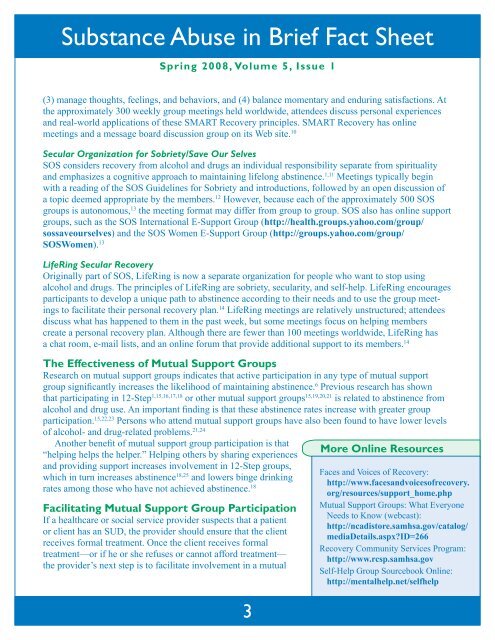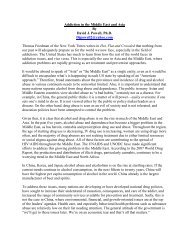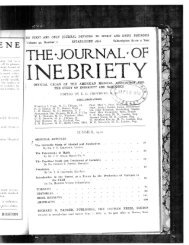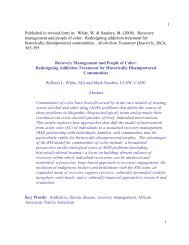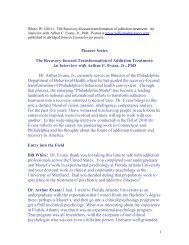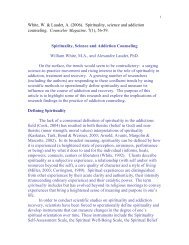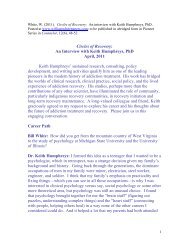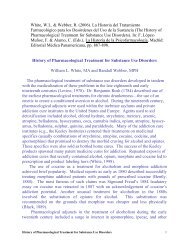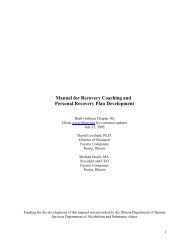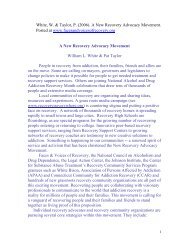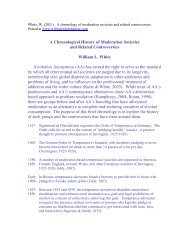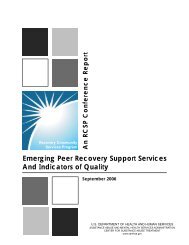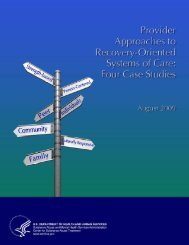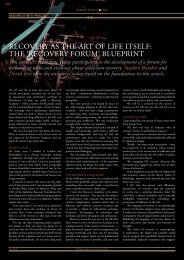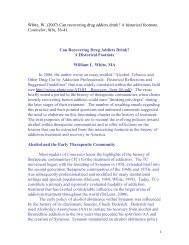An Introduction to Mutual Support Groups for Alcohol and Drug Abuse
An Introduction to Mutual Support Groups for Alcohol and Drug Abuse
An Introduction to Mutual Support Groups for Alcohol and Drug Abuse
You also want an ePaper? Increase the reach of your titles
YUMPU automatically turns print PDFs into web optimized ePapers that Google loves.
Substance <strong>Abuse</strong> in Brief Fact SheetSpring 2008, Volume 5, Issue 1(3) manage thoughts, feelings, <strong>and</strong> behaviors, <strong>and</strong> (4) balance momentary <strong>and</strong> enduring satisfactions. Atthe approximately 300 weekly group meetings held worldwide, attendees discuss personal experiences<strong>and</strong> real-world applications of these SMART Recovery principles. SMART Recovery has onlinemeetings <strong>and</strong> a message board discussion group on its Web site. 10Secular Organization <strong>for</strong> Sobriety/Save Our SelvesSOS considers recovery from alcohol <strong>and</strong> drugs an individual responsibility separate from spirituality<strong>and</strong> emphasizes a cognitive approach <strong>to</strong> maintaining lifelong abstinence. 1,11 Meetings typically beginwith a reading of the SOS Guidelines <strong>for</strong> Sobriety <strong>and</strong> introductions, followed by an open discussion ofa <strong>to</strong>pic deemed appropriate by the members. 12 However, because each of the approximately 500 SOSgroups is au<strong>to</strong>nomous, 13 the meeting <strong>for</strong>mat may differ from group <strong>to</strong> group. SOS also has online supportgroups, such as the SOS International E-<strong>Support</strong> Group (http://health.groups.yahoo.com/group/sossaveourselves) <strong>and</strong> the SOS Women E-<strong>Support</strong> Group (http://groups.yahoo.com/group/SOSWomen). 13LifeRing Secular RecoveryOriginally part of SOS, LifeRing is now a separate organization <strong>for</strong> people who want <strong>to</strong> s<strong>to</strong>p usingalcohol <strong>and</strong> drugs. The principles of LifeRing are sobriety, secularity, <strong>and</strong> self-help. LifeRing encouragesparticipants <strong>to</strong> develop a unique path <strong>to</strong> abstinence according <strong>to</strong> their needs <strong>and</strong> <strong>to</strong> use the group meetings<strong>to</strong> facilitate their personal recovery plan. 14 LifeRing meetings are relatively unstructured; attendeesdiscuss what has happened <strong>to</strong> them in the past week, but some meetings focus on helping memberscreate a personal recovery plan. Although there are fewer than 100 meetings worldwide, LifeRing hasa chat room, e-mail lists, <strong>and</strong> an online <strong>for</strong>um that provide additional support <strong>to</strong> its members. 14The Effectiveness of <strong>Mutual</strong> <strong>Support</strong> <strong>Groups</strong>Research on mutual support groups indicates that active participation in any type of mutual supportgroup significantly increases the likelihood of maintaining abstinence. 6 Previous research has shownthat participating in 12-Step 1,15,16,17,18 or other mutual support groups 15,19,20,21 is related <strong>to</strong> abstinence fromalcohol <strong>and</strong> drug use. <strong>An</strong> important finding is that these abstinence rates increase with greater groupparticipation. 15,22,23 Persons who attend mutual support groups have also been found <strong>to</strong> have lower levelsof alcohol- <strong>and</strong> drug-related problems. 21,24<strong>An</strong>other benefit of mutual support group participation is that“helping helps the helper.” Helping others by sharing experiences<strong>and</strong> providing support increases involvement in 12-Step groups,which in turn increases abstinence 18,25 <strong>and</strong> lowers binge drinkingrates among those who have not achieved abstinence. 18Facilitating <strong>Mutual</strong> <strong>Support</strong> Group ParticipationIf a healthcare or social service provider suspects that a patien<strong>to</strong>r client has an SUD, the provider should ensure that the clientreceives <strong>for</strong>mal treatment. Once the client receives <strong>for</strong>maltreatment—or if he or she refuses or cannot af<strong>for</strong>d treatment—the provider’s next step is <strong>to</strong> facilitate involvement in a mutual3More Online ResourcesFaces <strong>and</strong> Voices of Recovery:http://www.faces<strong>and</strong>voicesofrecovery.org/resources/support_home.php<strong>Mutual</strong> <strong>Support</strong> <strong>Groups</strong>: What EveryoneNeeds <strong>to</strong> Know (webcast):http://ncadis<strong>to</strong>re.samhsa.gov/catalog/mediaDetails.aspx?ID=266Recovery Community Services Program:http://www.rcsp.samhsa.govSelf-Help Group Sourcebook Online:http://mentalhelp.net/selfhelp


